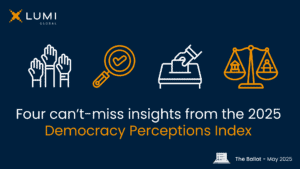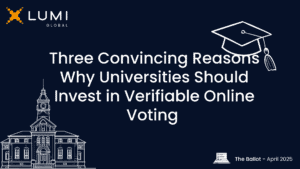When discussing online voting, it is common to also mention terms such as “digital democracy,” “e-democracy,” “e-participation,” and so forth. These terms can mean different things to different people. Nonetheless, a common thread runs through them: they are about the idea of carrying out democratic processes (including drafting proposals, debating, and voting) electronically.
In essence, online voting is just one part of a broader concept about how things we use daily, such as computers and the internet, can be used in service to democracy. With this in mind, we would like to discuss how the internet fits into traditional democratic institutions and processes as a useful supplement to improve accessibility, not a substitute aiming to replace more traditional democratic processes.
What are we covering?
The Expansion of Democracy in the Digital Realm
The growth of the internet and digitization in the last several decades has opened the doors to proposals about how technology can help existing democracies. Particularly, citizens are now able to communicate with governments and each other like never before via the internet. Thus, it is a good idea to think about how these technologies can be used to connect policymakers to those they represent and/or make it easier for citizens to directly contribute to policy-making. Here, we present some interesting avenues through which citizens are already able to digitally engage in democratic processes in a number of different places.
Interaction With Parliaments and Legislators
In any representative democracy, citizens should be able to access and/or ask questions to their representatives with little difficulty. The internet provides a chance for governments and organizations to bridge the gap between voter and representative in a variety of ways. In Germany, for example, citizens are able to directly ask their parliamentary representatives questions via the website abgeordnetenwatch.de, after which all visitors to the website may see the answer from a representative. In a similar vein, voters in the Netherlands may interact with their legislature through internetconsultatie.nl, where they are invited to see what bills are being debated in parliament now, write their opinions on them, and submit their views to parliamentarians. In both examples, while representatives are still responsible for turning citizens’ ideas into policies, their decisions can now be more informed via citizen input offered through online platforms.
Writing Proposals Directly to Lawmakers
Of course, as online voting and petitions become widespread, this also opens up new opportunities for citizens to experience more “direct” democracy. Most notably, both Denmark (borgerforslag.dk) and Slovenia (predlagam.vladi.si) offer citizens the chance to propose laws via the internet, with citizen proposals receiving a vote in parliament if they have enough verified signatures (or “votes”) from citizens.
Additionally, the European Union offers citizens to propose legislation via the European Citizens’ Initiative (ECI), where citizens may suggest and sign proposals of their choice. When a proposal gets one million signatures, it will be referred to the European Commission for further consideration. Notably, the most successful of these ECIs, the Right2Water campaign, collected 80 percent of its signatures online, showcasing the contribution technology can make to bringing citizens closer to governing bodies. Most importantly, citizens may also form and sign ECI proposals on paper as well, meaning that citizens are able to choose whichever methods suit them best in order to voice their opinions. Slovenia (predlagam.vladi.si) offer citizens the chance to propose laws via the internet, with citizen proposals receiving a vote in parliament if they have enough verified signatures (or “votes”) from citizens.
Local-level Participation
More locally, participatory budgeting, a process where citizens of a locality directly decide or suggest how local tax money should be spent, has become easier to carry out via the internet. Often using online voting, some citizens in countries such as Brazil, Peru, and Argentina are already able to choose how their municipalities should spend their money, a process which can be an important “promoter of citizenship and citizen participation.” Even political parties, such as Podemos (Spain) and the Five Star Movement (Italy), have made use of the internet to enhance their intra-organizational democracy with online tools which enable “debate, knowledge sharing, voting, e-learning, and more.” Meetings and elections in both towns and political parties may still be held in person, but interaction online regularly helps bridge gaps between citizens and representatives in both cases.
“E”nhancing Democracy
In short, digitally-facilitated democracy is about “interactions with the intention of affecting changes” to institutions, whether in governments or private organizations. Thus, a critical reason why governments seek to use tools such as online voting is to “make democratic institutions more efficient and productive.” However, as previously mentioned, the internet has also opened up the possibility of more direct democracy or hosting “citizens’ assemblies” to discuss policy proposals. Notably, in California, the California Report Card project allows citizens to give the state government “grades” on timely topics online. After submitting their “grades,” participants join an online “cafe” with similar users where they may discuss their votes and proposals based on them. Ideally, citizens in these “cafes” arrive at a consensus and can submit a concrete law proposal for the government. While such meetings can (and often do) take place in person, the role that the internet can play in making democratic processes more accessible for voters cannot be understated.
Stated simply, democracy facilitated through electronic means is meant to be “additional, complementary, and interlinked with the traditional processes of democracy.” Yet, sometimes it is misunderstood as a full-scale replacement for paper ballots or even for representative democracy. What we have shown here is that internet-based tools, ranging from asking politicians questions to voting online, can make invaluable contributions to existing democracies as a “supplement” to traditional processes instead of “substituting” them.


